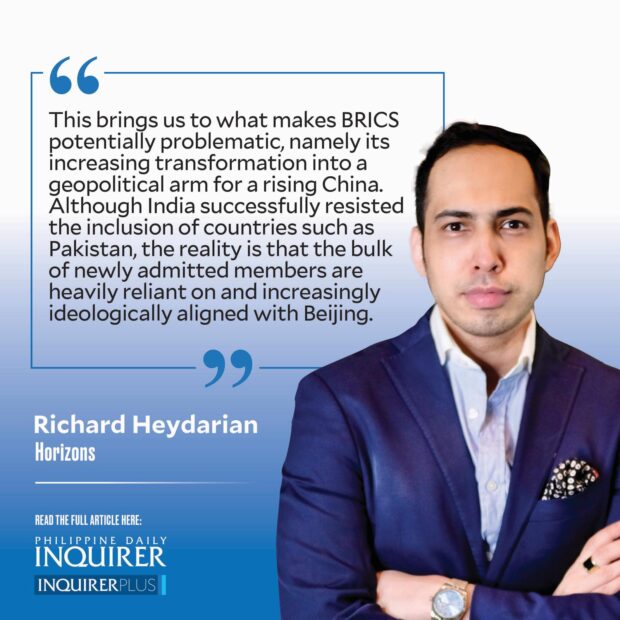From Bandung to BRICS: A post-Western world?

His counterpart was no less than Jawaharlal Nehru, India’s legendary statesman, who insisted on building a common post-colonial front with Maoist China against both the capitalist West as well as Soviet Communism. Just a few years later, Romulo, an anti-communist liberal, was brutally vindicated, when China’s People’s Liberation Army (PLA) pierced through disputed Himalayan borders and inflicted a humiliating defeat on India.
According to Romulo, Nehru, bedridden in his twilight years, acknowledged his fatal mistake, reportedly telling his Filipino counterpart during an emotional reunion in New Delhi: “General Romulo, how right you were at Bandung! And how wrong was I.”
Article continues after this advertisementThe Bandung Conference (1955) was a watershed moment in modern history, especially for dozens of newly liberated nations, who suddenly found themselves painfully vulnerable amid a raging Cold War between Washington and Moscow. Eager to preserve the hard-earned independence of new, fragile nations, Sukarno, Indonesia’s swashbuckling founding father, gathered leaders from across Asia, Africa, Eastern Europe, and Latin America.
Almost all nations in attendance had suffered from one form of Western colonialism or the other. Ancient powers from China to Persia had been humiliated, while the likes of India were fully colonized. Thus, rejection of Western neocolonial advances was a de facto consensus among all those in attendance. But as historian Lisandro Claudio explains, the sticking point was “[t]he categorization of the Soviet Union as [an] imperialist [power].”
Unlike many of his counterparts, however, Romulo argued for a truly independent position, which “condemn[s] all colonialism, both overt and potential,” since “[w]e were opposed to every form of domination, subjugation, or the exploitation of peoples,” including the tyrannical communist regimes that emerged from Moscow to Beijing and Pyongyang.
Article continues after this advertisementOver the next half a century, multiple attempts at creating a robust alliance of post-colonial nations were either sabotaged by the West, domestic upheavals across the post-colonial world, and, in more extreme cases, tragic conflicts among newly formed nations themselves: India and Pakistan came to blows on multiple times, while communist China invaded communist Vietnam.
And this, dear reader, brings us to the BRICS organization, composed of Brazil, Russia, India, China, and South Africa, which collectively just admitted six new members from across the post-colonial world. For some, BRICS Plus represents a second attempt at creating an effective global “nonaligned” movement, if not a harbinger of a truly post-Western global order in the 21st century.
In fairness, the expansion of BRICS does signal the revolt of newly emerging powers against the West’s centuries-old “gatekeeping prowess.” Several members of expanded BRICS are currently under the most severe Western sanctions regimes, which are primarily hurting their civilian populations. And then, there is strategic prestige: If the Group of Seven (G7) is “business class,” then the BRICS is like “premium economy.”
Moreover, the new power bloc provides a mechanism for institutionalized dialogue among its new members, namely the Middle Eastern powers of Iran, Saudi Arabia, and the United Arab Emirates, which have been exploring a rapprochement.
But the BRICS hype should be tested against evidence. To begin with, the organization lacks organizational substance: No real permanent secretariat or a legally binding charter of note. The New Development Bank (NDB), the single financial institutional establishment by the BRICS nations, has been notoriously ineffectual: In a decade of existence, its total lending has been a tenth of what the likes of the World Bank dispense with in a single year.
And for all the talk of “de-dollarization,” even the NDB is desperately in need of dollars to sustain itself. Even more ironically, the very concept of BRICS is itself a product of Wall Street, namely an early-2000s Goldman Sachs report.
This brings us to what makes BRICS potentially problematic, namely its increasing transformation into a geopolitical arm for a rising China. Although India successfully resisted the inclusion of countries such as Pakistan, the reality is that the bulk of newly admitted members are heavily reliant on and increasingly ideologically aligned with Beijing. Intent on remaining nonaligned, Indonesia even demurred from joining BRICS. Less than a century after the Bandung Conference, Romulo’s strategic ambivalence has become evermore poignant.















